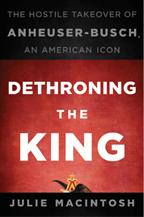 This post is written at Forbes blogs – Work in Progress.
This post is written at Forbes blogs – Work in Progress.
We look at stories in the press about businessmen and male leaders who make questionable decisions, and we think to ourselves, “Well maybe it wouldn’t have gone down that way if a woman were involved.” We won’t always know if that’s the case, but sometimes we can get that perspective.
Financial Times journalist Julie MacIntosh took on a story that would put the He-Man Woman Haters Club to shame. In Dethroning the King: The Hostile Takeover of Anheuser-Busch, An American Icon, Julie writes the sordid details of how InBev landed the best deal of 2008…all because of a little family dysfunction. I had the pleasure of speaking with Julie about the story, being a female journalist, and what we can all learn.
After a history covering the futures, automotive, and airline markets, it only seemed natural Julie would cover the M&A news of the InBev takeover. “I think being a woman and being able to build a rapport with sources helped me tell this story,” said Julie. “I built credibility because I am trustworthy and want to hear from these people whose lives were changed.”
Unfortunately, the chaos of 2008 buried the story and most of Bud’s most loyal customers may have no idea the infamous Busch family is no longer running the show. Thank goodness Julie thought there was more to share.
Pick up this book, and you’ll probably spend most of your time trying to get the shocked look off your face as you turn the pages. Our key players, August III (The Third) and August IV (The Fourth), have personalities suited for daytime soap operas. Julie worked hard to get them accurate, and you begin to see the decisions these two would make even before they show up in the book. The biggest lesson I took from this book was that you cannot lead through fear. It isn’t sustainable.
“Anheuser-Busch employees knew that if they didn’t get to the office each morning by the time The Third arrived, they were already late,” Julie said. “The pressure to put in face time and be ‘on’ 365 days a year was intense. Sitting at your desk waiting for your boss to leave isn’t an efficient use of time, and companies need to weigh that.”
Ruling with a heavy hand may have been what brought the King down. Would the presence of more women have changed that?
What we know of the situation was that decisions were rarely questioned, and if they were, it was more like The Third reestablishing the preferred decision The Fourth had been too passive to support.
“This was not only a lack of gender balance,” said Julie, “but the lack of a diverse group willing to question. If you have [a diverse group], it keeps people from issuing statements that they assume everyone will agree to. People don’t assume they’re surrounded by a bunch of ‘yes’ men, so they aren’t shoving their own agenda down colleagues’ throats. You also don’t have to worry about the ‘yes’ men always capitulating because they aren’t there.”
There is also a lesson in what is equal vs. what is fair. For example, former AB executive Francine Katz is known in the news for claiming the locker room culture contributed to her earning less, among other allegations.
“There is a difference between the locker room atmosphere and sexual harassment,” said Julie, “but the interesting thing is she was paid less than her predecessor, but he had decades of experience and she didn’t have the same credentials. Instead of looking at just the numbers, there are often legitimate reasons or there may be reasons that are unfair, but that’s for a judge to decide. We shouldn’t jump to conclusions about these kinds of situations when we don’t know enough.”
It will also be up to future companies to learn from stories likeDethroning the King. One thing Julie said that will continue to make companies progressive and competitive is thinking about the balance of productive energy a company can get from an employee.
“We need to make it easy for people to get results instead of pushing to be over capacity all the time. If we gave people flexibility when there isn’t a deadline, they’ll perform when the pressure’s on. That’s going to continue to be important for women and families, and companies need to invest in ways to address those issues now instead of when talent leaves for flexibility somewhere else.”
Finally, you don’t have to be an MBA student like myself to appreciate the leadership lessons based in the Busch family story. Women have hurdles still to climb, but we have a lot of assets to use. “It would be refreshing to see more women in numbers-oriented jobs – chairing a board of directors’ audit committee, for example, or working as treasurers and CFOs,” said Julie. “In the field of M&A, I’d love to see more women hammering together deals between oil companies or auto makers, rather than advising retailers or cosmetics companies. Mixing it up can have a real impact.”
Dethroning the King: The Hostile Takeover of Anheuser-Busch, An American Icon is available at major retailers and online for purchase. You can learn more about Julie MacIntosh from her website JulieMacIntosh.com.




